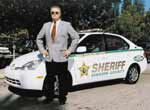|
Our demands aren't so radical after all
By Jenny Coyle
Yes-the anti-environmental Bush administration has control of the Senate and the House and, before long, will control the top federal judiciary as well.
But take heart! Environmental forces still have The People. Polls show that when it comes to the environment, people line up behind the Sierra Club, not the Bush administration. Turns out it's not so radical after all to want clean air, clean water, and healthy forests.
 |
| You Have the Right to Get Good Mileage: For Wyatt Earp, director of fleet management for Marion County Sheriff 's Department in Florida, purchasing fuel-efficient hybrid vehicles and reducing dependence on oil make sense for the environment-and the county budget. |
Ask Wyatt Earp, director of fleet management for the Marion County Sheriff's Office in Florida. (Yes, he's related to the Wyatt Earp of old West lore; the original was his great-great-uncle.)
When gas-electric hybrid vehicles hit the market, Earp did some cost analysis to see whether it would be a good idea to pay a little more up front for a car that gets superior mileage. The answer?
"It zeros out when you factor in that you'll have the car for five or six years and run it for 100,000 miles," he said. "It costs a little more to start with, but operating expenses are less. Plus, we're working for the environment and showing people that we don't need to be so dependent on foreign oil. We want to make a statement that we can be more self-contained than we are."
Mind you, the four Toyota Prius vehicles used by the department are not patrolling the streets or engaging in high-speed chases. Rather, they're being used to deliver subpoenas, transfer prisoners, and run administrative errands.
The real star of the fleet, however, is the Prius that serves as the department's "Homeland Security Patrol." Trained civilians use it to cruise the county checking out bridges, pipelines, and other potential terrorist targets, ever on the watch for signs of tampering.
"We work to conserve as much energy as we can-that's our obligation to the American people," said Earp. "We spend taxpayers' money wisely, and that means we don't run experiments. We've got a good car here. Hopefully American car companies will offer something similar, soon."
Earp has been working with the Sierra Club to promote the use of hybrids. In fact, at this year's Florida Sheriffs Association conference in Tampa, he invited Darden Rice, the Club's global warming and energy organizer in Florida, to speak to the crowd.
Meanwhile, in South Carolina, organizer Virginia Sanders found herself almost getting arrested for promoting something basic, but apparently a radical idea to some: free speech.
Sanders and others had gathered with rally signs at the Columbia Metropolitan Airport in South Carolina one day in late October when President Bush was scheduled to fly in. They set themselves up in an area where they were sure Bush would see them. "Our message," said Sanders, "was in support of clean air- you know, a really wild idea."
As they stood waiting, some security people approached and ordered them to move to a designated area that they later learned was one mile down the road in a location where President Bush would not see them. They refused to budge, and the security folks got testy. They brought in Secret Service agents who informed Sanders and the others that they had to move because that area was not "a free-speech zone."
Sanders was aghast.
"Well I thought the whole country was a free-speech zone," she said to the agent. "In fact, I'll bet my husband, a permanently disabled Vietnam vet, thinks the whole country is a free-speech zone, too. And I'll bet my brother does, too-he's missing an arm from his service in Korea."
This did not sway the agent, who insisted that Sanders leave or risk arrest. Sanders didn't mind risking arrest, but wasn't familiar with the Sierra Club policy on civil disobedience. So she got on her cell phone and tried to call her supervisor to ask whether it was OK with the Sierra Club for her to get arrested. He wasn't there. So she called his supervisor, who also was not there. (Sierra Club policy is to use "all lawful means.")
Sanders put her phone away and turned to the agent.
"I want you to know," she said, "that I'm a child of the civil rights era, and I've been arrested more times than you have toes on your feet and fingers on your hands, but I'm not getting arrested today."
Meanwhile, miles and miles away on the Lolo National Forest in Montana, where the Sierra Club is conducting a citizen inventory of roadless areas, conservation organizer Bob Clark relies on the help of 35 local citizens-only five of whom started as Club members. Most are just local residents who "get it."
Clark gives the volunteers maps of the area to be inventoried, and either sends them off on their own or tags along. They walk the perimeter of the area looking for old and new roads, off-road-vehicle trails, and signs of wildlife, whether they be footprints, scat, or the animal itself.
"People care about the land, and they're committed and willing to spend their valuable time working to protect these areas whether or not they're affiliated with an environmental organization," said Len Broberg, conservation chair for the Montana Chapter. "Regular folks understand how special-and vulnerable-these places are."
Up to Top
|